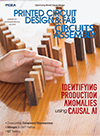News
Latest News
ARLINGTON, VA -- Component orders continued to climb in November, taking a "brief pause" for the US Thanksgiving holiday, the Electronic Components Association said today.
MACAO – Deswell Industries reported second-quarter net sales of $20.8 million, down 35.3% year-over-year.
Deswell provides a host of services, including contract electronics assembly. The company cited lower demand for plastic injection molding and audio and instrument equipment.
Net income was $3.1 million for the second quarter, compared to net loss of $1.7 million last year.
The firm posted an operating loss of $1.3 million for the quarter, compared to an operating loss of $1.7 million for the same quarter of 2008.
Net sales for the six months ended Sept. 30 were $43.6 million, down 35.2% year-over-year.
Operating loss for the six-month period was $1.5 million, compared to an operating loss of $400,000 in 2008. Deswell reported net income of $2.9 million, compared to a loss of $400,000 last year.
“We are expecting some sales to be generated in the coming quarters from new market segments, such as audio amplifiers, products with LCD display and others,” said CEO Franki Tse.
SINGAPORE – Flextronics has added 900 employees at its Zalaegerszeg, Hungary plant, a local newspaper says.
The decision to hire came as a result of an increase in orders, particularly for a new mobile phone.
The firm currently employs 4,900 people at the plant. At the beginning of 2009, Flextronics laid off nearly 1,000 workers there, but hired 1,000 again by early summer.


